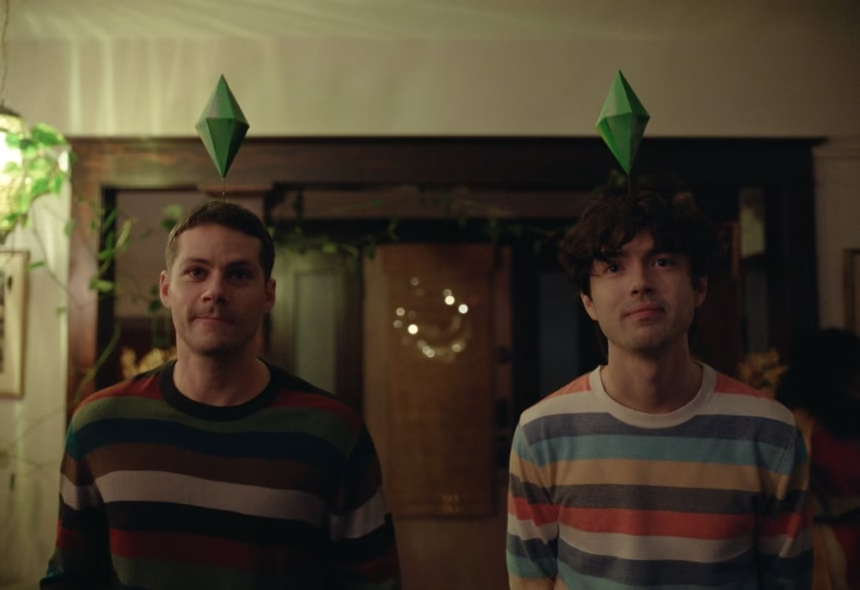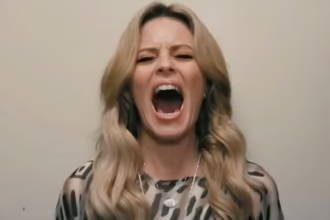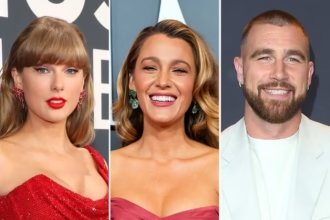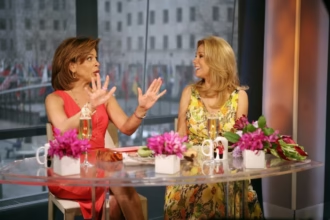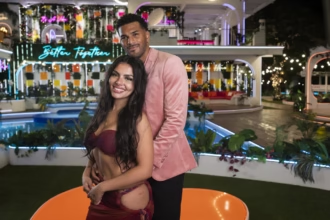For Dylan O’Brien, Twinless meant confronting an emotion he’s long dreaded.
“Grief is, funny enough, something I have not experienced a ton,” O’Brien, 34, exclusively tells Us Weekly. “I think about it in a grateful way and in a fearful way, in that I fear I won’t be able to handle it.”
Yet the 34-year-old found himself drawn to this script about, as he calls it, a very “unique type of loss.”
Warning: Spoilers below for Twinless:
Written and directed by O’Brien’s costar James Sweeney, Twinless casts the versatile actor in dual roles as Roman, a 20-something trying to process the death of his twin, and that brother, Rocky. At a grief support group, Roman connects with Dennis (Sweeney), a fellow “twinless” soul who quickly becomes his fragile lifeline. But as their friendship deepens — and boundaries blur — secrets threaten to crack their bond wide open: Dennis isn’t a twin at all but a man who once had a one-night stand with Rocky and sought Roman out under false pretenses.
“These are all universal feelings: loneliness and grief, identity, friendship,” O’Brien explains. Here, he tells Us more about stepping into his most personal role yet:
Us Weekly: How did you go about portraying this heavy emotion realistically?
Dylan O’Brien: I’ve experienced loss to some degree, but for the most part, I’ve been very fortunate. I still have both of my parents and most of my family and friends. But I think I’m a very sensitive human. I have other areas of deep pain that I have gone through in my life, and it felt in my world, certainly. I’ve always been somebody who’s been really struck by other people’s experiences in a really deep way. So I was certainly struck by this piece as a whole. We’re talking about such a unique type of grief and a unique type of loss. When I first read it, I thought it was such a beautiful honoring of this existence on earth, one that I had never seen before, and one that I felt like was handled so respectfully and sensitively and beautifully.
Us: Is that how you were able to tap into Roman, who’s so empathetic?
DOB: I just felt him. I just was that guy. And I mean that truthfully, like, in a way that I don’t know necessarily happens that much. I’m not somebody who engages with my craft in a way that comes from training or technique. There’s so many different ways you can approach this. And I’ve learned in such a raw way because I didn’t go to school, I didn’t train, and I didn’t learn all of those things. I wasn’t put in classes as a kid. It’s not how I found my way to this. The only thing I can rely on is my authentic connection to a thing. And this was the most I’ve ever deeply felt like my [character] ever. It’s just something that I became really close to. It just struck me.

Dylan O’Brien, James Sweeney Roadside Attractions/Lionsgate Films
Us: How did you and James find your onscreen chemistry as insta-friends?
DOB: James and I have all kinds of life conversations. Whenever you’re trying to measure whether you want to collaborate with somebody, it can be tough. You have lunch, and you’re just like, “Oh, are we going to do a movie?” You’re like, “Yeah, they seemed OK, but I didn’t really get to know them.” Something that James and I do really effortlessly and always have, is talk about life. And we’re both very sensitive people. There’s a lot of similarities that we’ve gone through and I think we appreciate similar things, like intimacy in a relationship, and what needs to kind of be there for that to exist for us.
Us: Roman goes through so much in this film. Is there a scene you’re most proud of?
DOB: [There’s a] hotel room scene [where Roman breaks down] that even shocked me in the moment. I couldn’t believe what transpired, because it was just so real. It was like so much pain inside myself, that we all have in our own way, was uplifted, but it was on behalf of [Roman] and this concept, this story, this someone. People have experienced [actual twin loss] in this world, and it’s just something that I became really close to.
Us: That scene is so guttural. How do you prepare for such an emotionally heavy scene like that?
DOB: [The hotel scene] in the movie is the first take. It’s the first time I performed the scene. It’s funny, because so much of this is learning on the fly. And in this business, even if you train or go to school, being on set and making things is a whole new ball game. But I have been doing it long enough to at least have learned things about myself. If I had a really emotional or vulnerable scene [in the past], I’d come into the day tight because I’d be nervous and I’d be really sensitive about my space. I would be like, “Oh, I need to go inward,” when usually I’m very loose while I work. I take the work hyper-seriously, but I think part of what makes me feel comfortable is that I love to laugh, I love to joke and I love the community of making things. So in the past, I’ve come in then and all of a sudden been like, “No, today I can’t talk to anybody, and I need to focus.” Because, what if I’m goofing around and then I can’t execute the emotion? And I think that used to hold me back. Because on [this film] I behaved as I always did. You would have never known that I had this tragically heavy thing to be executing. I wasn’t approaching it flippantly. I prepared it like nothing I prepared before. I wanted to honor it word for word, which is also something that, as an actor, I’ve never really done ever. So I memorized only the words but I never practiced performing it. I knew that I wanted to keep that as fresh as possible. You can’t rehearse that. So I approached it the way I approached every day: loose, comfortable, but definitely communicating the space that we were going to need. And our crew was tremendous in respecting that and providing that for us and James was tremendous in providing the support of listening to everything that I needed. I don’t know that I’ll ever be prouder of a scene in my life.

Dylan O’Brien, James Sweeney Roadside Attractions/Lionsgate
Us: Your scenes with Lauren Graham, who plays your estranged mom, feel very raw and alive. Were they improvised?
DOB: The [second scene we have together] is entirely improvised. That was one of the only improvised things in the movie, because James is a really talented writer and the dialogue is specific and it’s fantastic and has intention in terms of planting seeds and paying off. But when we are arguing in the kitchen, we were trying different things [for that scene] each time. Ultimately, we’re really trying to make it an authentic portrayal of a mother and son in grief, yelling over each other and having all these feelings. They still have such a long way to go in how to communicate with each other. One of the things I love about the story is there’s not a bow tied on me and Lauren in the movie. And I think that’s so human. I love that you don’t see us in some montage beat hugging. I really love [Lauren]. I remember she was so emotional the day that we were yelling at each other.
Us: You’ve said you don’t enjoy doing sex scenes unless there’s intention behind them, and Twinless has multiple intimate scenes. Why did they feel needed?
DOB: On the one hand, [with] Rocky, in such a short amount of time we need to know so much about who this guy was. He [has] such a sexual energy. And I think that that was such a piece of him. He’s the kind of guy who can walk up to you at a shady diner and immediately let you know with his little sip and eyes that he wants to bang you. And that’s fun! I love people like that, who own their sexuality and are sexual beings and they love it.
Us: Roman also gets close to his girlfriend, Marcie, played by Aisling Franciosi.
DOB: Yeah. He’s such an inward character who I think struggles across the board, especially with what he’s currently going through, to be open. He’s really never been to that many other cities before, let alone traveled the world or met that many other people, so I love seeing Roman with Marcie, and what that brings out in him. From the moment she comes into his life, he gets so cute. He has these cute moments, these little silly, cute sides of him and, yeah, an intimate side to him in terms of his sexuality as well, which I think is really warming to see.
Us: Last, you’ve been vocal about wanting to see rom-coms make a comeback. Why?
DOB: Something that I miss seeing nowadays is this level of cinematic intention and sophistication to them. We still have them, but it’s like they need to be dumb and cheap. That was just never the case — A-list actors did rom-coms! There were movies that you’d be, like, sobbing at the end. There was smart, cunning dialogue and chemistry and fun sequences. I think Twinless is an exceptional example of harking back to those types of movies.
This interview has been edited and condensed for clarity.
Twinless is in theaters now.


